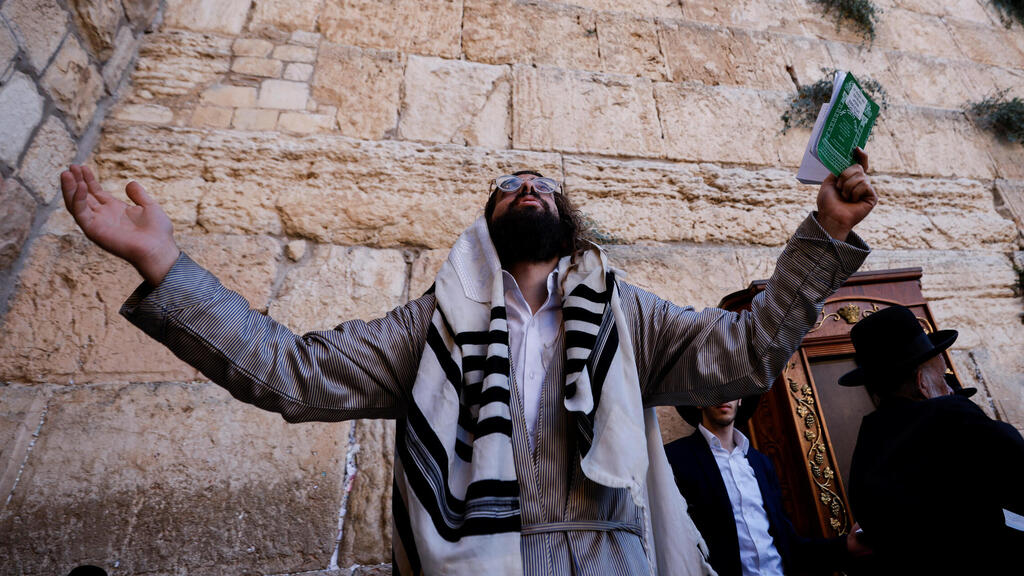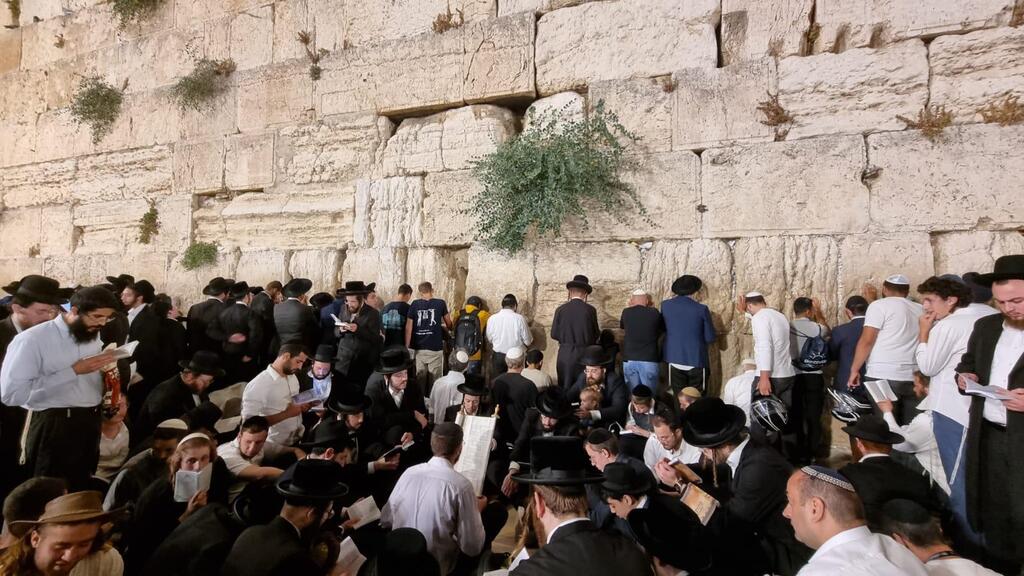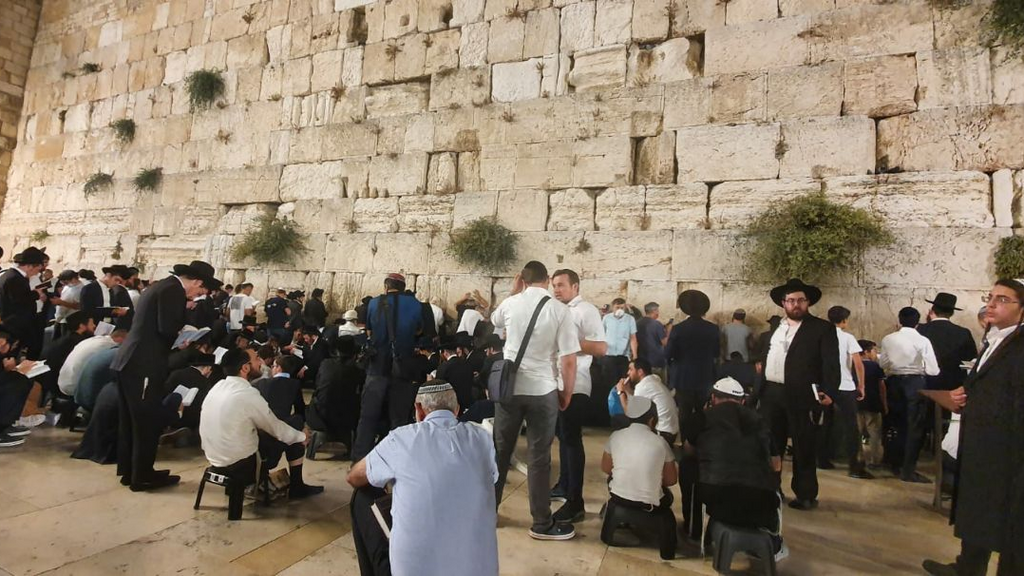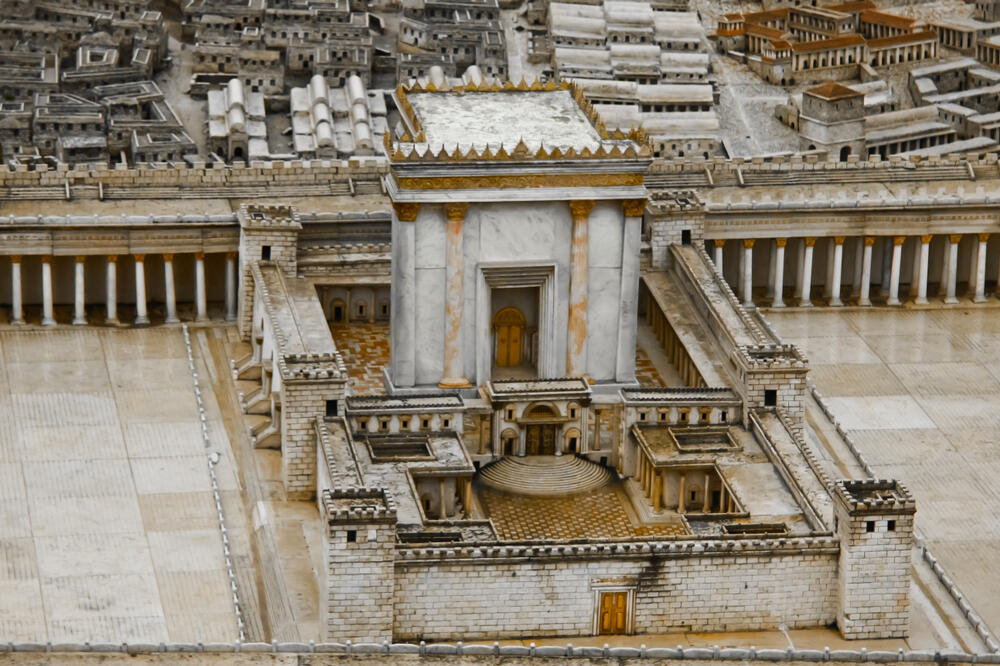The Mishna, Ta’anit 26b, describes all the different terrible events that happened on Tisha B’Av, or the 9th of the Hebrew month of Av, which begins this year on Monday night and lasts for 25 hours. On that day throughout Jewish history: it was decreed upon our ancestors in the desert that they would not enter the land of Israel; the first and second Temples were destroyed; Beitar was captured; and the city of Jerusalem was overrun.
The First Temple stood for 410 years (Yoma 9a). On the seventh day of Av, the Babylonians entered The First Temple, on the ninth day of Av it was set on fire and destroyed.
The Second Temple was also destroyed on the ninth of Av after a five-month siege on the city of Jerusalem. Thus, some mourning observances begin before Tisha B’Av and continue until the middle of the 10th of Av.
For this year, the military rabbinate ruled that soldiers taking part in operational activity due to the Iron Swords war are prohibited from fasting on Tisha B'Av. The rabbinate said that fasting during an operational activity is life threatening. The instructions come after, three weeks ago on the fast of the 17th of Tammuz, two soldiers in the north and one in Gaza found themselves in a life-threatening situation during an operational activity because they were fasting.
The military rabbinate explains that soldiers in the field in all sectors, including the Gaza Strip, northern Israel and inside Israel, and those who may be called up for operational activity as well as soldiers who are on guard should eat and drink in order to be able to function optimally.
6 View gallery


Tisha B'Av prayers at the Western Wall, the last remnant of the second Holy Temple
(Photo: Amit Shavi)
From Monday evening before the start of the fast until hours after the end of the fast, Jews from all backgrounds and communities will come to the Western Wall to mark the day of mourning at the most symbolic place of the destruction. Thousands will sit on the ground and lament the destruction of the holy temples in all the traditions and versions, as is fitting for a place that unites and brings the nation together.
On Monday evening, the Western Wall Heritage Foundation will hold a reading of the Book of Lamentations and the recitation of lamentations by cantors in both Sephardic and Ashkenazi traditions.
The recitation of the lamentations will be broadcast by the Western Wall Heritage Foundation on the Western Wall website for those who cannot physically come to the Western Wall Plaza, starting at 22:00.
A prayer for the unity of Israel will be held toward the end of the fast, at 7 p.m. on Tuesday. The prayer will also be for the return of the hostages, for the safety of the soldiers and recovery of the wounded, with the participation of the rabbi of the Western Wall and holy sites, Rabbi Shmuel Rabinowitz, other rabbis and public figures, the families of the hostages, and bereaved families. The national prayer, as well as the prayer and singing that comes at the end of the fast also will be broadcast live beginning at 6:30 p.m. from the Western Wall and from dozens of locations in Israel and around the world.
Here are some of the laws and customs of Tisha B'Av:
Before the fast
Midday of the day before Tisha B’Av (and until the end of the fast) we study only sections of Torah which discuss the laws mourning, the destruction of the Temples and the tragedies which befell the Jewish people throughout our history, while there are those who are more lenient.
'Separation Meal': The meal eaten before the fast begins consists of one dish (Taanit 26b), for how can we eat a plentiful meal before the fast?
Some eat a larger meal before the Mincha afternoon prayer service, followed by the somber meal (a piece of bread and a bit of ashes, sitting on the floor).
Some have a custom of eating a single meal, after Mincha, and not eat one dish, but rather other satisfying food, and at the end of the meal they sit on the floor and eat a hard-boiled egg dipped in ashes, which signifies mourning.
Beginning of the fast: At sundown.
Anyone wearing leather shoes removes them and all go to the synagogue.
In the synagogue: The curtain is removed from the ark, and the lights are dimmed, worshippers sit on the floor and the book of Lamentations is read.
The actual fast
The five prohibited activities on Tisha B’Av are eating and drinking, washing, anointing, donning leather shoes and marital relations (Taanit 30).
Washing: One is not allowed to wash one’s hands. When one awakens in the morning, one should wash one’s hands only up to the knuckles. The same should be done after one uses the bathroom. One may rinse dirt off with water, and if needed with soap.
Anointing: Medical ointments, Vaseline and odorless deodorant are permissible, as the purpose is not pleasurable. Other lotions and creams are not permitted.
Shoes: One may not wear any shoe that is made of leather; if the shoe has a leather decoration and such that does not hold the foot – one may be more lenient.
It is allowed to wear shoes that are not leather even if they are comfortable, but if there are less comfortable shoes (or slippers) it is considered better to use them.
Performance of activities known as 'melacha': In the Talmud (Ta’anit 30), it is indicated that whoever performs a melacha – the thirty-nine categories of activity which Jewish law identifies as prohibited by biblical law on Shabbat – on Tisha B’Av, does not see blessing from it ever. However, there is no actual prohibition, but rather it is dependent on the custom of each place. The usual custom is to avoid doing any form of melacha until midday.
After midday, one may perform such activities if it involves an important need, and if refraining from such an activity will result in a significant and irretrievable loss, it is permissible to do melacha all day long.
The reason for forbidding melacha is to avoid distraction from mourning. Therefore, there is no prohibition on non-distracting activities, such as turning on a light or driving a car, which are prohibited on Shabbat. It also is permissible to write things related to Tisha B’Av or mourning.
In addition, it is customary to start preparing food after midday toward the end of the fast. It is permitted to prepare food for children or for sick people during the fast.
Greeting: One may not greet another person with a verbal greeting such as “Hello” or “Good Morning."
Torah Study: Study is prohibited because it causes the heart to rejoice, but passages that are related to the destruction or other sad matters, such as the book of Job are permitted.
Sitting: One may not sit on a chair, but on the floor or a low chair (whose height is less than 24 cm, and if needed, less than 30 cm).
Charity: It is good to donate to charity on a fast, and there is no problem giving a gift.
Illness: Someone who is ill, even if his life is not in danger but whose body is weak, is exempt from fasting and does not need to eat shiurin, a method of eating less than one ounce at s time at regular intervals during a fast.
A woman up to 30 days after childbirth may eat on Tisha B’Av. A woman who has passed 30 days after childbirth, is legally required to fast, but practically this varies depending on her strength, if she is breastfeeding, the age of the baby and more, and she must consult a rabbi.
A pregnant woman must fast according to the law, but in fact, in many cases, there are leniencies, because of fear for the wellbeing of the fetus and her own health and, therefore, it is recommended that she ask a rabbi.
Children: According to Jewish law, children are exempt from fasting. It is customary to educate them to fast for part of the day, from the age at which they understand the mourning of destruction. However, since this is only a matter of education and not law, their fast should not be prolonged.
There are those children for whom the fast will mean they will not eat or drink during the night, and others who will continue the fast until 10 a.m. or shortly after. In any case, it is proper to give the young ones only simple foods so they will feel the mourning of the destruction.
Brit Milah: If there is a ritual circumcision, it is performed after the recitation of kinot (elegies). The prevalent custom is to perform the brit toward the end of the day, toward a time of comfort. Blessing over wine is performed and the new mother will drink, and if she cannot, the newborn is given a taste of the wine.
After the Tisha B’Av fast
The fast ends when three stars appear in the night sky, about 26-27 minutes after sunset (according to the Land of Israel calendar). It is customary to perform a ritual hand washing three times. Kiddush Levana, the blessing on the moon that is said monthly, should also take place. One should taste something before Kiddush Levana.
The restrictions of the Nine Days of communal and personal mourning that precede Tisha B'Av are still in effect until midday on the tenth of Av, because the Temple continued to burn through the 10th.
We are privileged to have a state of our own and an army of our own, but Tisha B'Av allows us to feel even deeper what is still missing, the dIvine spirit. By understanding what we lack, we should merit- to see the building of the Temple soon.
- Rabbi Rimon is the Rabbinic Head of the Jerusalem College of Technology and the Head of its Batei Midrash and serves as the rabbi of the Gush Etzion Regional Council.
First published: 18:43, 07.26.23






